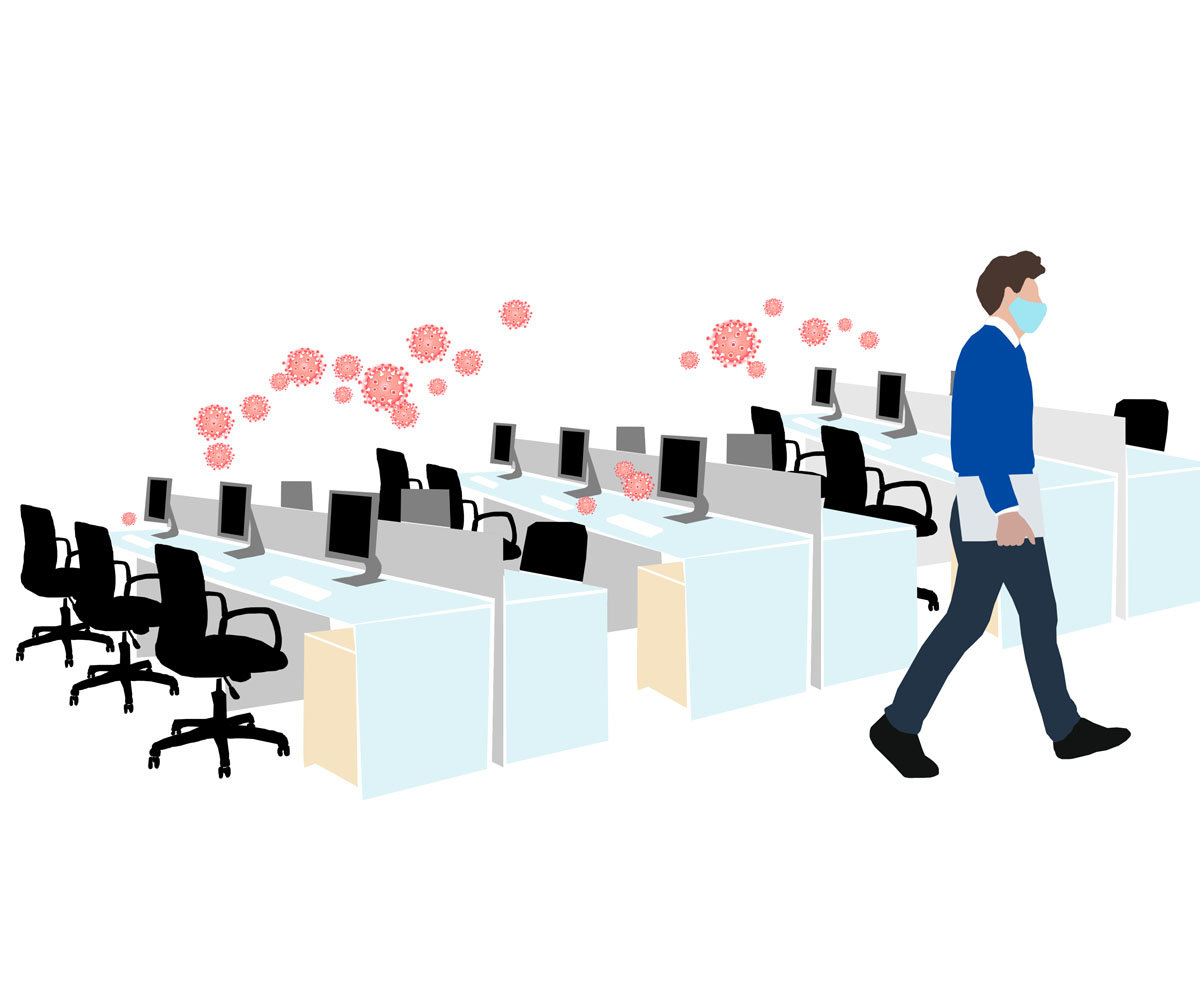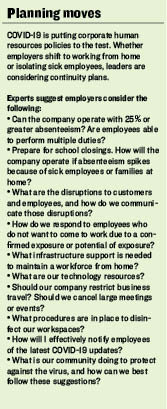YOUR BUSINESS AUTHORITY
Springfield, MO
YOUR BUSINESS AUTHORITY
Springfield, MO








Employees are being sent home across the country as concerns of the new coronavirus continue to spread, leaving many offices and businesses empty.
Some of the world’s largest companies – Facebook, Google, Twitter and Ford – are asking employees to work from home, and local businesses are beginning to make the shift. With governments calling for social distancing, employers have begun to implement telecommuting and sick leave policies to reduce the spread of COVID-19.
Karen Shannon, vice president of business consulting at Ollis/Akers/Arney, said hundreds of local business leaders have reached out to the insurance and risk assessment firm on what to do next. Shannon said most employers have created business continuity plans to some extent, but many in the area haven’t considered alternatives, such as telecommuting or extended paid sick leave policies.
“This has just been so quick that many businesses have not had that continuity plan in place,” she said. “The decisions to be made are consistent across every business; some of the solutions and adjustments in workflow can change based on the type of industry.”
Shannon suggested business leaders establish a paid sick leave policy, determine ways to work remotely and take into consideration employees who do not have internet at home. Ollis/Akers/Arney, which Shannon said is also working remotely as of March 16, prepared an informational package for employers to use during these conversations.
As of March 18, the Centers for Disease Control and Prevention reported 7,038 confirmed cases of COVID-19 and 97 deaths nationwide. The respiratory virus is confirmed in all 50 states, plus the District of Columbia, Puerto Rico, Guam and the U.S. Virgin Islands.
The CDC recommends that anyone who may feel sick should stay home and that symptoms of the virus may last up to two weeks, which puts sick leave policies to the test.
Pew Research Center reported this month that 24% of the U.S. workforce – or 33.6 million people – do not have access to paid sick leave, per the U.S. Bureau of Labor Statistics.
Shannon suggested employers keep a close eye on the CDC for further recommendations and information on the respiratory virus.
“A lot of the guidelines are things we should be doing to prevent the spread of influenza and others,” Shannon said. “I think this is creating awareness of good safety workplace practices that people have become lax on.”
Paul Satterwhite, partner at Spencer Fane LLP who practices in labor and employment, said the COVID-19 impact is unprecedented and ever changing.
“What we’re recommending to most businesses is that if work can be done from home, that they give that option,” Satterwhite said. “Most have some form of remote work in place, but the question is: Can they scale?”
Closures, layoffs
Some industries aren’t capable of remote work, such as in manufacturing or service-oriented retailers and restaurants, which Shannon said may lead to temporary closures. All local movie theaters recently announced closures, and Macy’s announced March 17 that it also would temporarily close its doors nationwide.
Mayor Ken McClure announced March 17 that businesses that provide entertainment or recreation and bar or food establishments should close except for delivery, drive-thru and carry out services. McClure also amended an ordinance enacted by Springfield City Council to ban public gatherings of more than 10 people.
National media outlets are reporting a potential for job loss and a recession to follow the COVID-19 pandemic. A poll conducted by NPR, PBS NewsHour and Marist indicated 18% of Americans said their work hours were reduced or their jobs had been cut since the COVID-19 crisis hit. Locally, O’Reilly Hospitality Management LLC has temporarily laid off an undisclosed number of employees in response to the impact on the travel industry.
Employers that choose to remain in the office can also make adjustments to protect employees against the contagious virus, according to the Occupational Safety and Health Administration. The agency recommends installing high-efficiency air filters, increasing ventilation and even installing a drive-through window for customer service.
“All you can do is attempt to be proactive rather than entirely reactive,” Satterwhite said. “You have to look at things from an immediate basis to the next couple of weeks, and then, what you’re going to do if it becomes an extended issue. What does this look like in three months? Hopefully, we’ll be well on the other side and the economy will be recovering.
“Businesses in Greene County are resilient, and our people are resilient.”
Cybersecurity concerns
Thomas Douglas, CEO of JMark Business Solutions Inc., said the company has received a high volume of requests from businesses to set up technology for remote work.
He said many businesses have considered remote work in a limited format, such as having one position set up to work outside of the office. But now employers are having to make companywide changes.
“It’s causing a shift in people’s thoughts on business continuity,” Douglas said. “But I think you can never be 100% prepared. There’s a certain amount of changes that happen in the moment that you have to adjust and adapt to, which I think is what’s largely going on.”
The shift to telecommuting has resulted in companies making large, last-minute technology purchases, like laptops and hard drives. So much so that some laptop brands are sold out, he said, much like the shortage of hand sanitizer and disinfectant nationwide.
The global pandemic also has led to increased scamming. Douglas said scammers have started creating fake emails that appear to be from the CDC or World Health Organization, urging people to click on links for additional information. Douglas said he was unaware of any local victims to these scams so far.
The U.S. Cybersecurity and Infrastructure Security Agency suggests using government websites for COVID-19 information and to avoid clicking on links in unsolicited emails.
“This shows how technology can hurt or help an organization to be successful in the midst of a disaster or pandemic,” Douglas said. “If the right thought and planning is done, it can be a great asset. If you don’t have the right infrastructure, it can cause panic and you won’t be successful.”
A franchise store of a Branson West-based quilting business made its Queen City debut; Grateful Vase launched in Lebanon; and Branson entertainment venue The Social Birdy had its grand opening.

